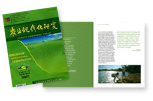- You are here: Home > About us > Address from the Director
 |
The Institute of Subtropical Agriculture (ISA), the Chinese Academy of Sciences (CAS),located in Changsha, a famous historical city, is a research base of Agricultural Science and Technology Innovation in the subtropical region of China deployed by the Chinese Academy of Sciences. The Institute was originally established in 1978 at the beginning of reform and opening-up, named Taoyuan Institute of Agricultural Modernization, and then moved to Changsha in 1979 with being renamed Changsha Institute of Agricultural Modernization, finally renamed the present one in October, 2003.
Major research themes currently established in ISA include: Subtropical agro-ecosystems and process manipulation; Livestock ecological system and healthy production; Molecular ecology and breeding of subtropical crops. Within each of these three main research themes, following areas are actively being pursued:
Research Theme 1
Regional agro-ecosystems and sustainable development: Studying the succession processes of agro-ecosystems integrating productivity with environmental issues in different subtropical regions, and developing techniques and optimum models to remedy the degraded ecosystems in the Karst region; studying the cycling of nutrients and water and optimum models for agro-forestry in the red-earth hilly region; and studying the succession of land–use and hydro-ecological systems, and developing models for agro-ecosystems in the Dongting lake region.
Dynamics and manipulation of processes in the subtropical agro-ecosystems: Investigating the mechanisms regulating the spatial variations of organic C, N, and P in various types of landscapes; demonstrating the potential of paddy soils for carbon sequestration, the biochemical transformations of N and P; and developing models to simulate carbon cycling and predicting changes in soil organic carbon; studying the process manipulation of subtropical agro-ecosystems with high-productivity, efficient use of resources, and environmental safety.
Research Theme 2
Healthy and environmentally-friendly pork production: developing a series of feed additives free contamination and elucidating their functional mechanisms; testing whether only soluble- non-starch polysaccharides affect the endogenous N losses in pigs; and studying the pre-treatment and nutrients recycling of waste caused by pig industry.
Integrating animal and crop production systems at the farm-scale in subtropical areas: manipulating the nutrition and metabolism of ruminants; improving grasslands in hilly regions; integrating dairy industry with crop-farming systems; improving the stability of grassland productivity; and studying the restoration of degenerated grassland ecosystem.
Research Theme 3
Molecular ecology of stress tolerance of rice and maize in subtropical areas: understanding the molecular mechanisms of stress tolerance in rice and maize by discovering the novel genes and signal transmit pathway in the course of stress response; developing genetic markers and cloning novel genes of stress tolerance in rice and maize to serve the breeding practice for the subtropical area of China.
Molecular breeding of stress tolerance of rice and maize in subtropical areas: breeding rice and maize variety for stress tolerance by genetic transformation and maker assistant selection, utilizing the heterosis of stress tolerance in rice and maize to provide combinations with high yield, good grain quality and multi-stress tolerance for subtropical area of China.
The Institute has currently about 80 academic staff (17 professors) and 140 post-graduate students and visiting scientists. There are currently three research centers and one key laboratory covering: i) the research center of subtropical agro-ecosystems and process manipulation; ii) the research center of livestock ecological system and healthy production; iii) the research center of molecular bio-ecology and breeding of subtropical crops; and ⅳ) the Key Laboratory of Agro-ecological Processes in Subtropical Region. There are three field research stations for the long term studies on the agricultural eco-systems in the red-earth hilly region, the Karst eco-system of southwestern China, and the wetland eco-system in Dongting lake, namely Taoyuan Observation & Research Station for Agro-ecosystem, Huanjiang Observation & Research Station for Karst Ecosystem, and Dongting Lake Observation and Research Station of Wetland Ecosystem, respectively. Taoyuan and Huanjiang Station have been certified as the membership of the Chinese Ecosystem Research Network (CERN) and the National Field Research Stations of China. There are one conferring station in ecology for Ph.D. degree and two M.Sc. stations in Ecology, and Animal Nutrition and Feed Sciences. Research of Agriculture Modernization which was founded in July 1980, has become a significant integrated academic Journal in the filed of agriculture modernization, and it has been indexed by Chinese Science Citation Database (CSCD).
Since the establishment, the Institute actively devoted into the main fields of national economic construction, and has made great contributions to agriculture development, ecological environment protection and economic construction. As one of the earliest institutions with regard to regional ecological agriculture research, ISA has formed some unique features and advantages on regional agriculture, livestock ecology and so on. The ISA has gained a series of significant scientific research achievements in the maintenance and protection of agro-eco-systems and new technologies that have successfully been applied in agricultural production in the subtropical region of China. Many relevant scientific achievements have played the leading role in the policy-making of government and the development of local agriculture and rural economics.
According to the goal of the Knowledge Innovation Project, facing the national strategic requirements for agricultural development of subtropical areas and ecological construction, uniting with the superiorities from CAS, home and abroad, ISA is making great efforts to construct the research and demonstration platform for agro-ecosystem of the subtropical areas, and to become an important part of national agricultural knowledge innovation system. Since the implementation of the knowledge innovation project, ISA has comprehensively been implementing the reform of institutions and mechanisms, and strengthening the basis research and ability construction, introducing the outstanding researchers, enhancing international science and technology cooperation, and deepening the innovative culture (namely “cohesion engineering”) construction. Therefore, ISA is steadily moving forward into the opening research platform of the sub-tropical agro-ecological system and the regional agricultural research institute with international reputation.
Warmly welcome all scientific research institutions, colleges and universities, enterprises and social circles to our institute to carry out the extensive and fruitful cooperation, and heartily welcome the outstanding oversea scholars to join us as well.
Address: Mapoling of Changsha City, Hunan province, P.R.China.Tel: +86-731-4615204 Fax: +86-731-4612685

